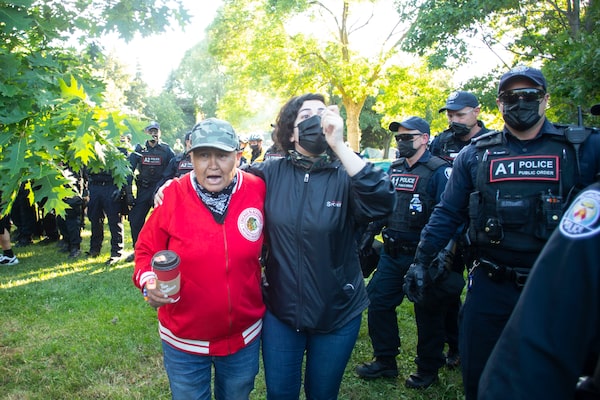
An Indigenous Elder, residential school survivor and 60's scoop survivor who identifies as "Redstone woman that walks with fire", left, is removed from a sacred fire area by police during an eviction process at a homeless encampment in Toronto on June 22, 2021.Chris Young/The Canadian Press
There’s a restaurant I pass often that is as expensive as it is mediocre. It closed recently, and a man experiencing homelessness promptly moved in to the covered patio.
This area, a somewhat fancy part of downtown Toronto, has been full of such disadvantaged people lately. And as their encampments have grown in the past two years, I’ve seen more private security hanging around, apparently hired by nearby building owners.
But it’s not just an issue with homelessness. These days, I see security guards wherever I go, from Dollarama to Shopper’s Drug Mart. In Ontario alone, there were more than 100,000 licensed security guards in 2021, a 13-per-cent increase from 2020. That is a massive milestone, considering that six years earlier in 2015, the province had only 70,000 guards, and their numbers actually declined in 2016.
Maybe it’s time to consider investing in the companies that provide such guards. They must be getting good business. After all, the Guardian, in research from 2017, estimated that in most parts of the world there are more private security workers than there are public police officers.
The rise of private security is, to be sure, a symptom of something horribly wrong with society. As the world becomes increasingly divided and tumultuous, the structures and norms that we’ve taken for granted seem to be eroding. Rising homelessness is just the tip of a dark and sordid iceberg.
In August of last year, the far-right U.S. Congresswoman Marjorie Taylor Greene hawked T-shirts that read “Defund the FBI,” amid a Federal Bureau of Investigation investigation of the former president Donald Trump. Ms. Greene’s message echoed one heard during the protests against police brutality in 2020. Across the political divide, we are united in our belief that we no longer trust those who are supposed to watch over us.
When that happens, it is not surprising that the number of police officers murdered in the United States surged nearly 60 per cent in 2021. Or that, in Canada, more police officers were killed last year than in the preceding five years.
And who can forget the chilling reports last year of how a gang of girls in Toronto allegedly stabbed to death a man experiencing homelessness? Or the disturbing string of subway attacks in the city lately?
Meanwhile, toward the end of 2022, the U.S. retailer Target revealed that it had lost US$400-million to theft, a 50-per-cent increase from the previous year – and there was still one more quarter to go before 2022 was up. A separate viral video recently shows shoplifters not even being subtle, brazenly grabbing merchandise under employees’ eyes.
These are all discrete events, but they draw from the same reserve. The concept of order in society, and that of the social contract – that we accept rules upon us and conform to collective norms so as to enjoy more comfortable lives than we can individually achieve without a community – is breaking down. And we are failing the most vulnerable among us.
Alas, I’m not smart enough to know the solution. I don’t know enough big words to write in policy papers. I’m only a hapless scribe who writes in a newspaper’s investing section.
I can write only about what I know, that according to the National Retail Federation in the United States, about half of businesses spent more on loss prevention in 2022 than in the year before.
And when Toronto Mayor John Tory’s recent plan to hire more police officers faced that much pushback, regardless of the merits of that proposal, it is no wonder that more people would now want to hire their own private cops.
Most of the major security players in Canada are, unfortunately, private businesses and non-investible, and there are few publicly traded companies that only provide security guards. There is also sadly no security-guard exchange-traded fund that I know of.
But this is a global phenomenon, and we can look at private security as a whole. The closest that I can find to a pure-play security-guard company is Securitas AB in Sweden, which in addition to guards also provides services in monitoring, consulting and investigations.
An alternative option is the American company ADT Inc., which provides electronic security and alarm monitoring for residences and businesses. Other names I’ve been looking at are The Brink’s Co. in the United States and another Swedish company, Loomis AB, which make money guarding the transportation of cash.
These companies have all been variously battered by the current market downturn, as with everything, but they are profitable and have price-to-earnings ratios that aren’t horribly high, meaning they are probably cheaper than they should be.
Don’t expect them to be like bitcoin and shoot up 100 per cent in a month. I view this as a long game, for I don’t expect the state of society to get any better, and slowly and surely, whatever urges that people have to hire private security now will only get more acute.
I remember at one point in 2021, back when that expensive and mediocre restaurant in downtown Toronto was still operating, and the underprivileged set up colonies of camps in the neighbouring park.
Police had descended upon the park like storm troopers, and the park remains fenced off to this day, ostensibly for “maintenance.”
But despite those efforts, those experiencing homelessness are still there, and the only thing gone is that horrid restaurant.